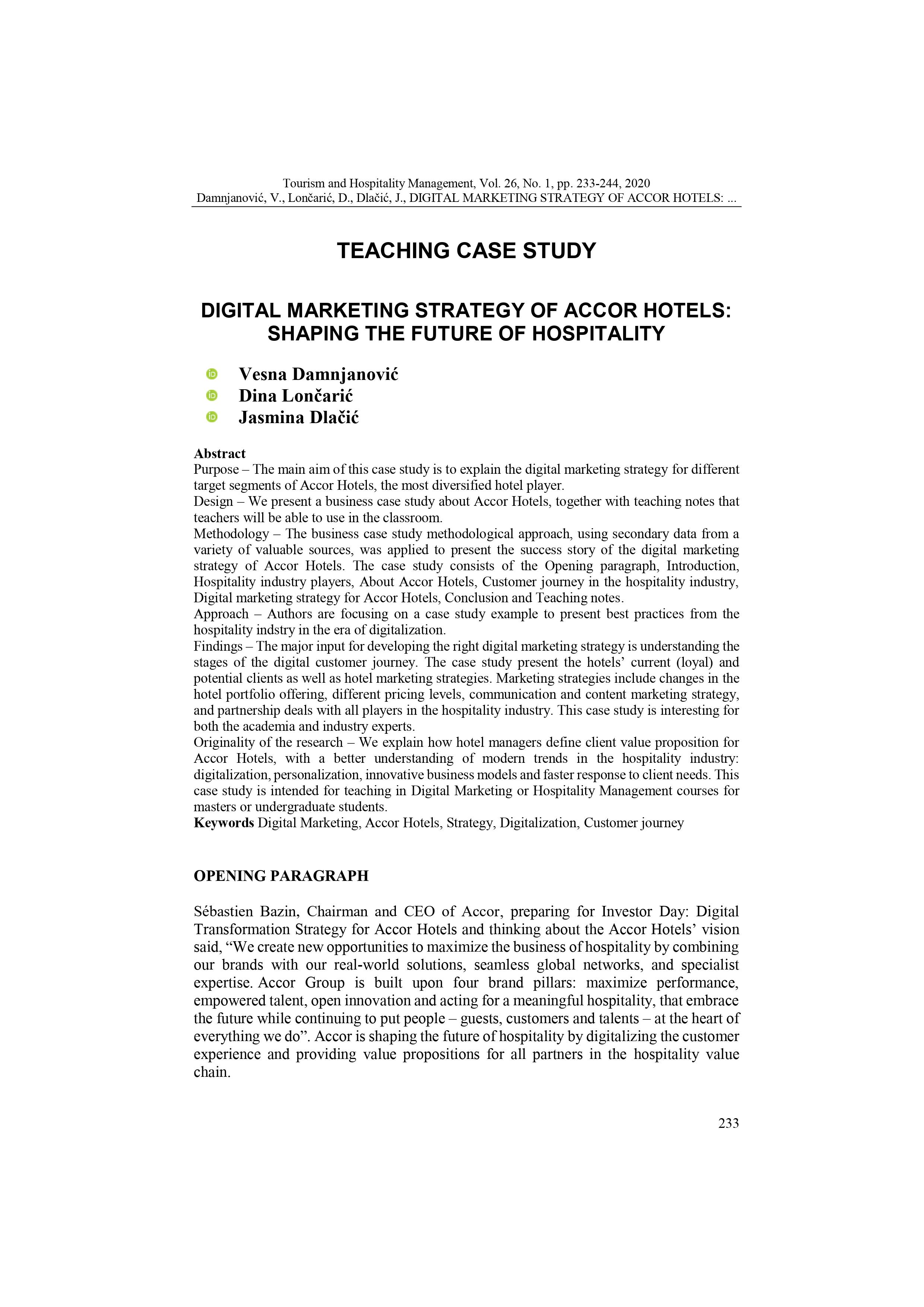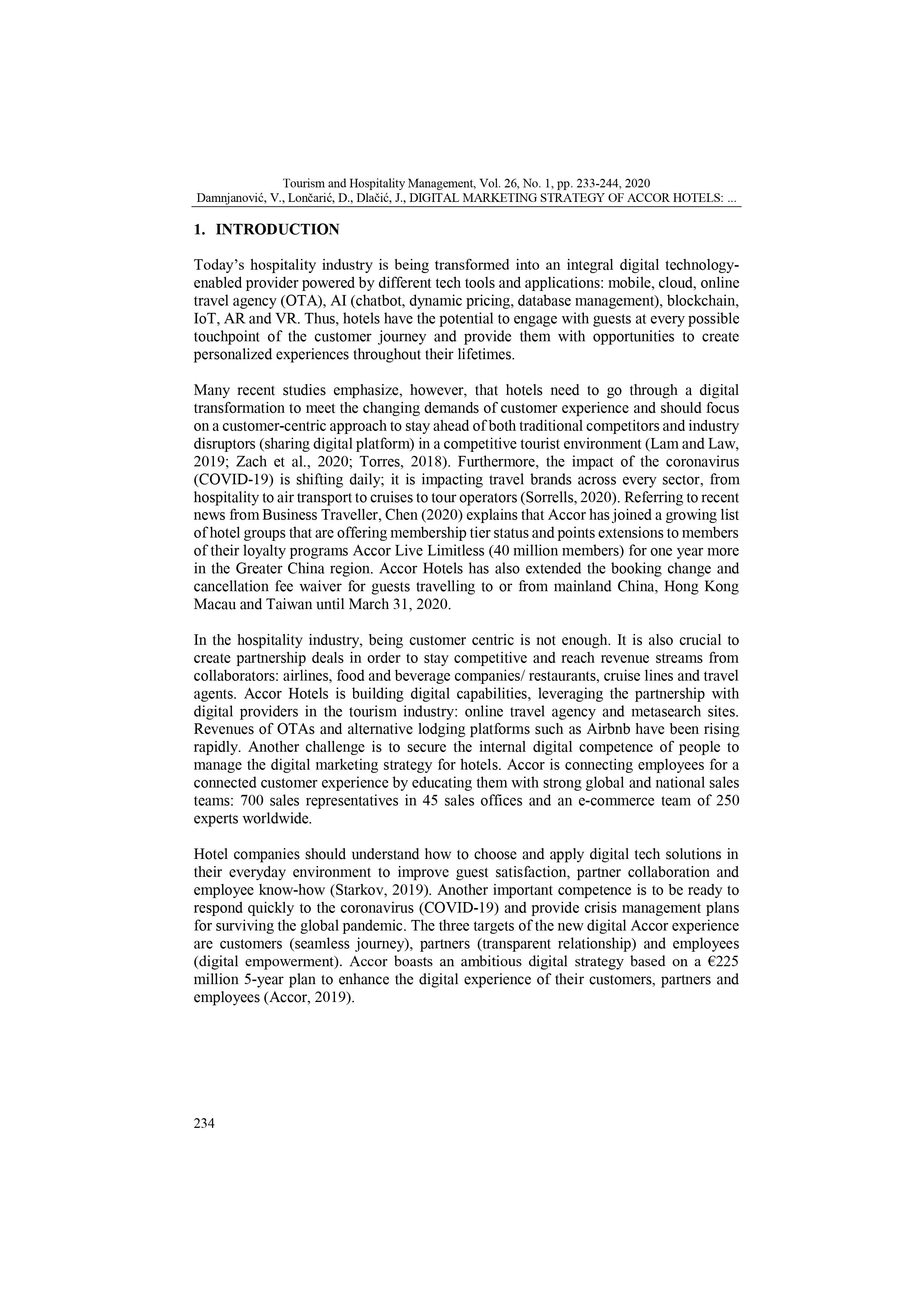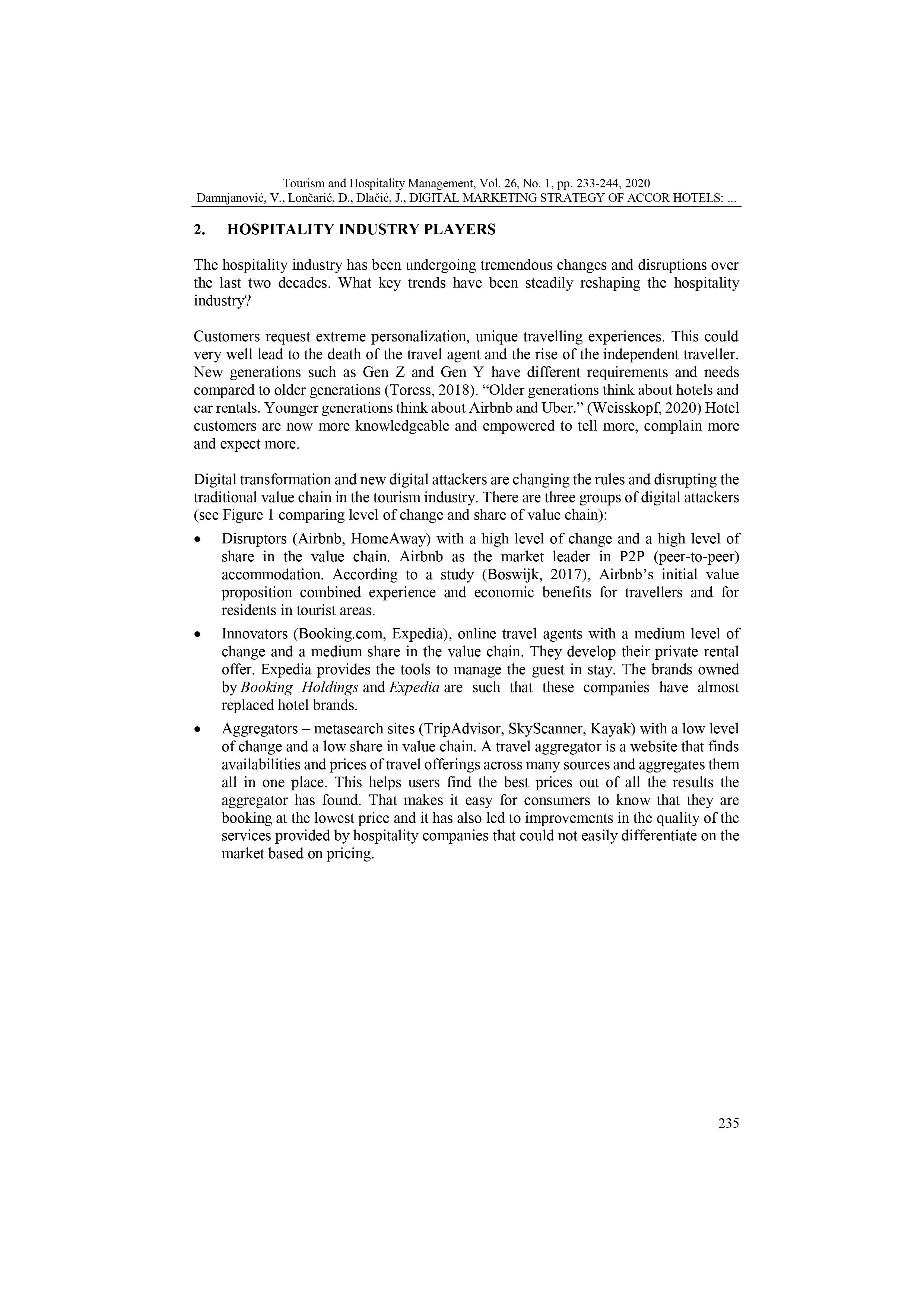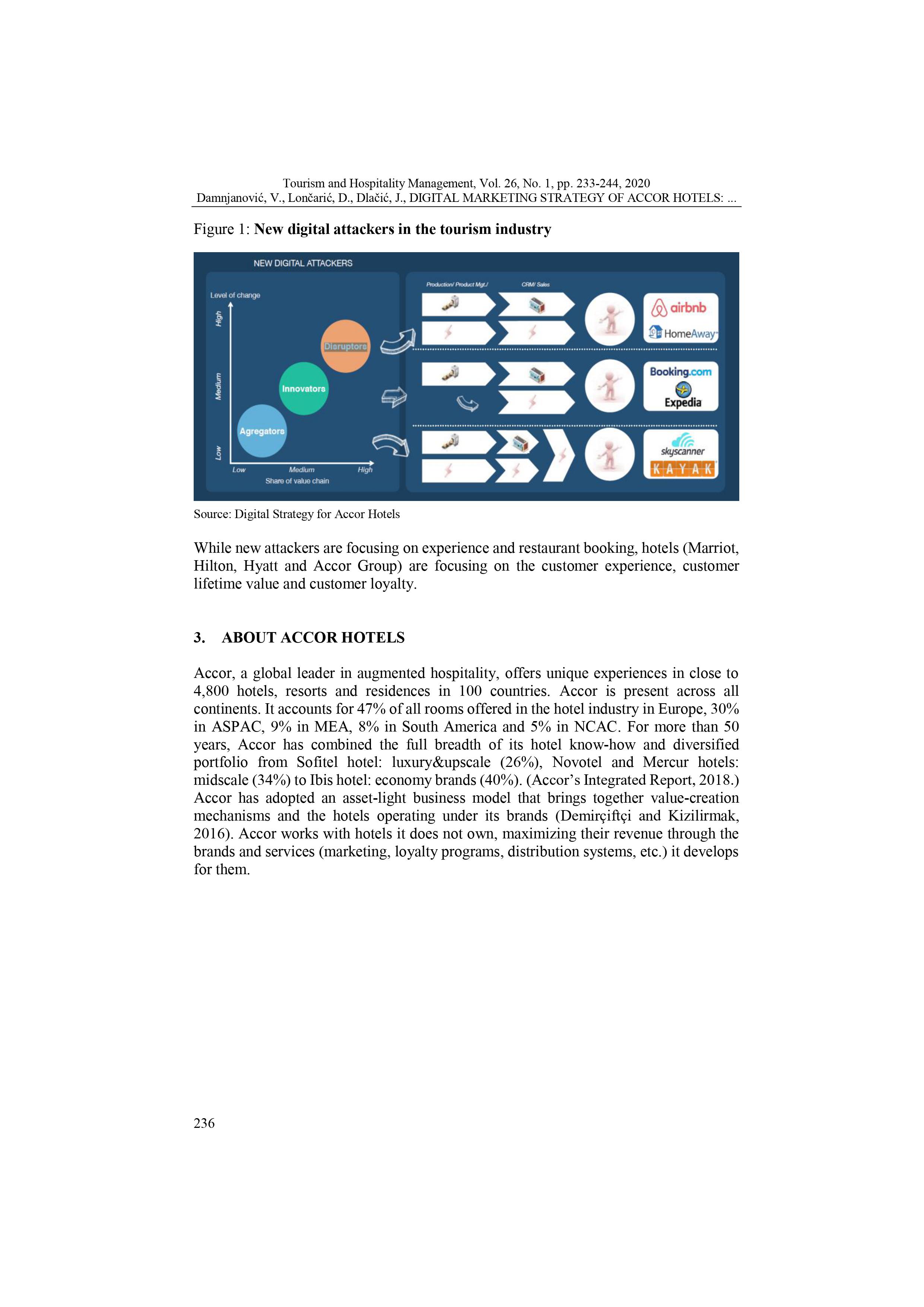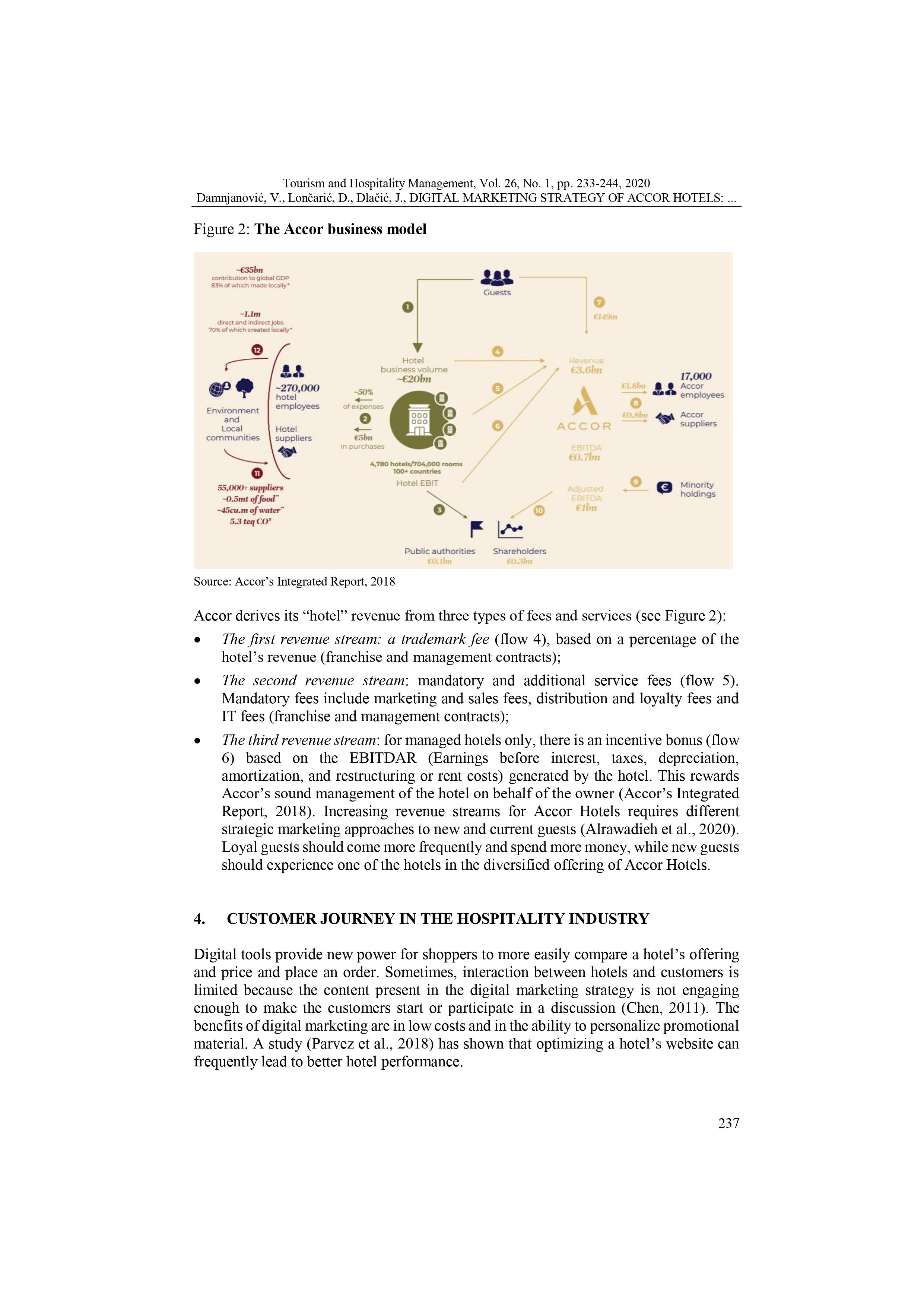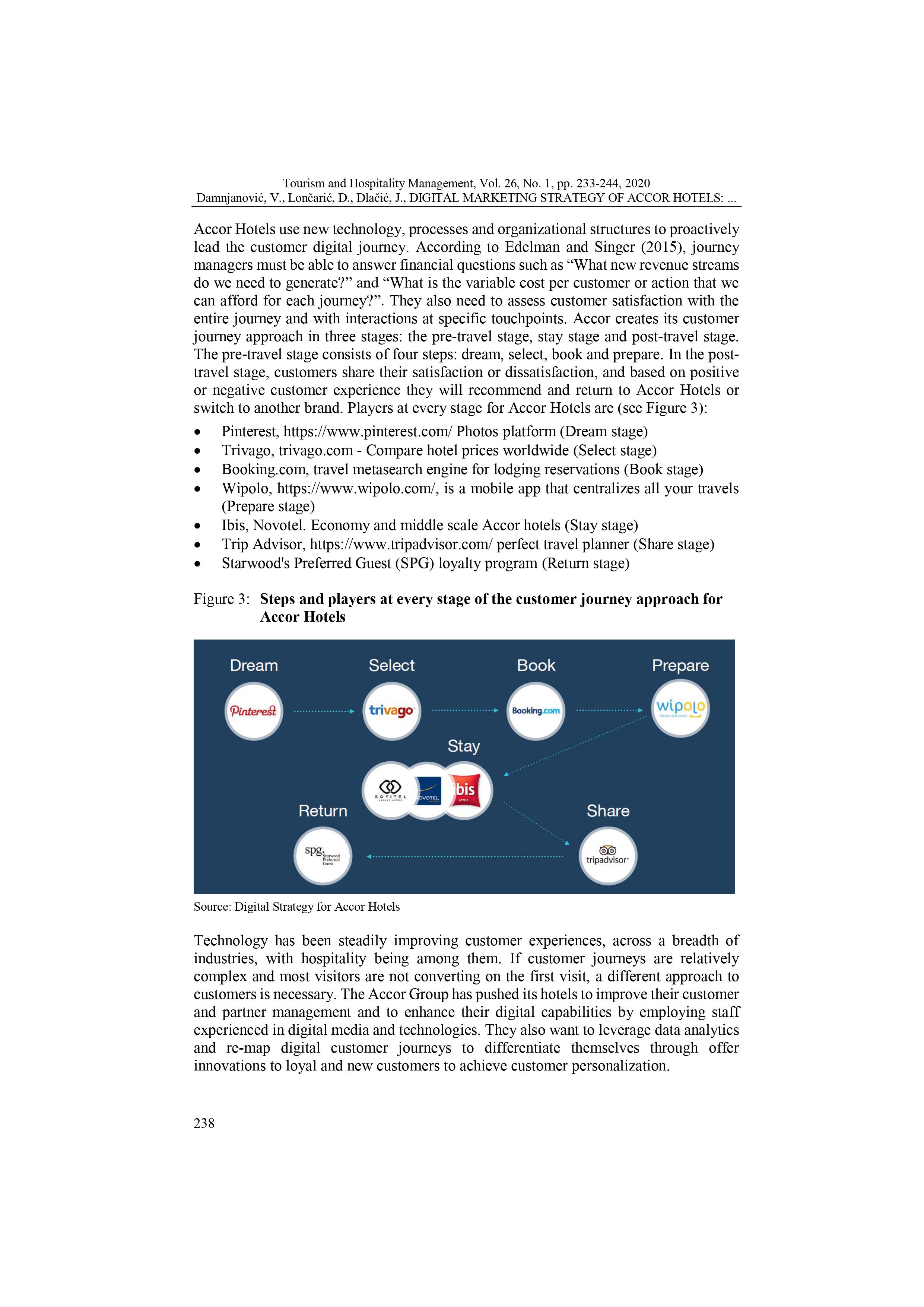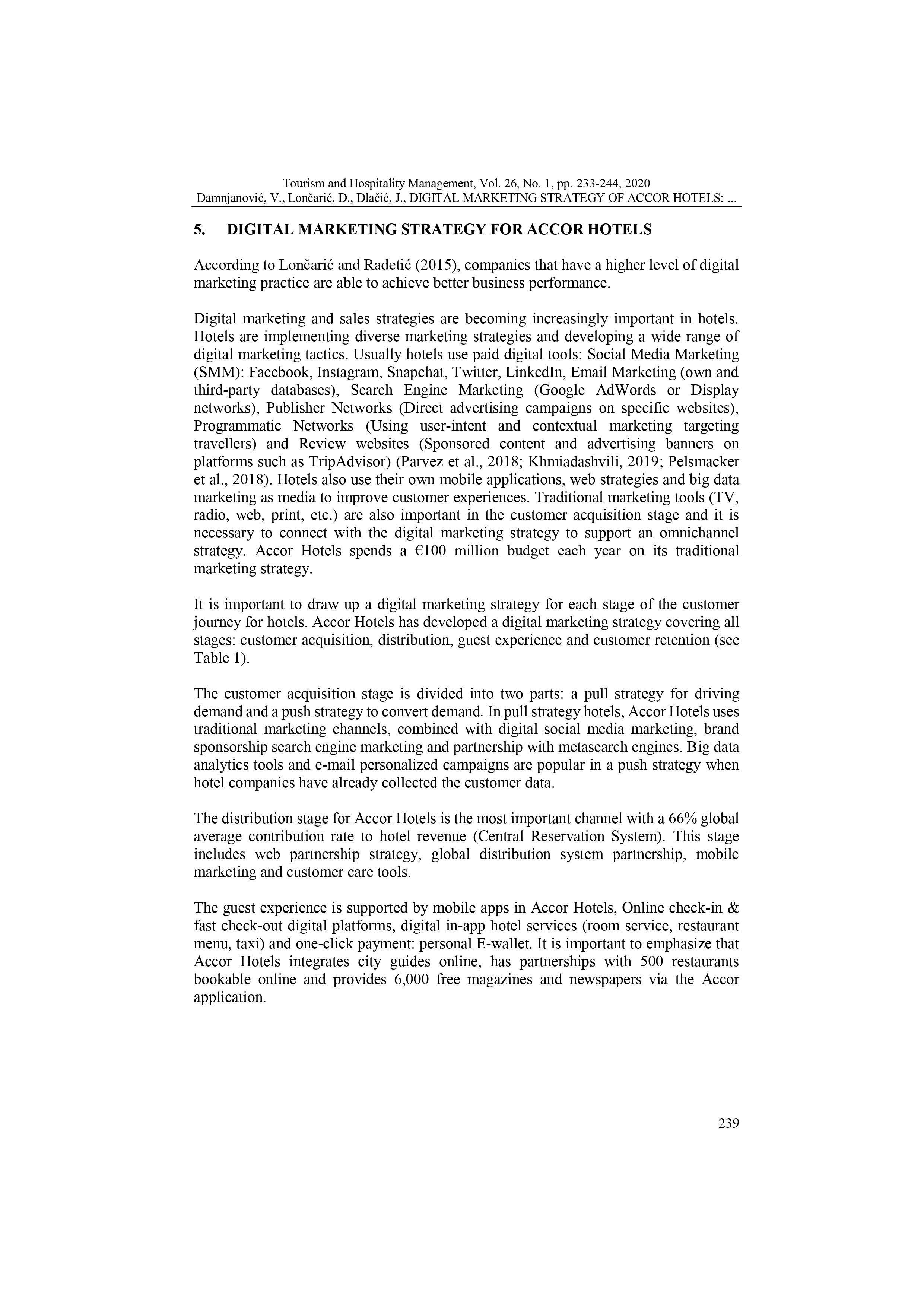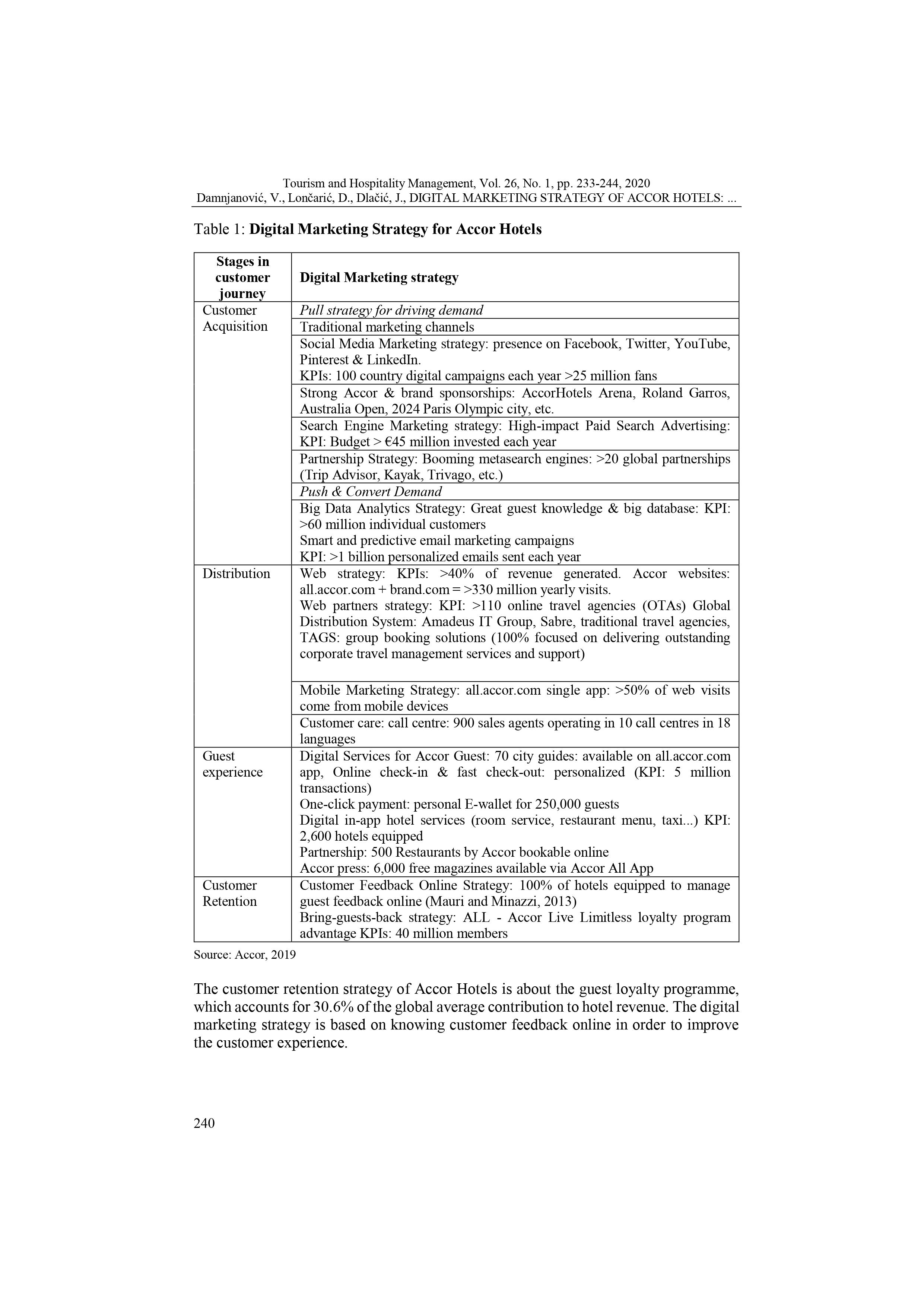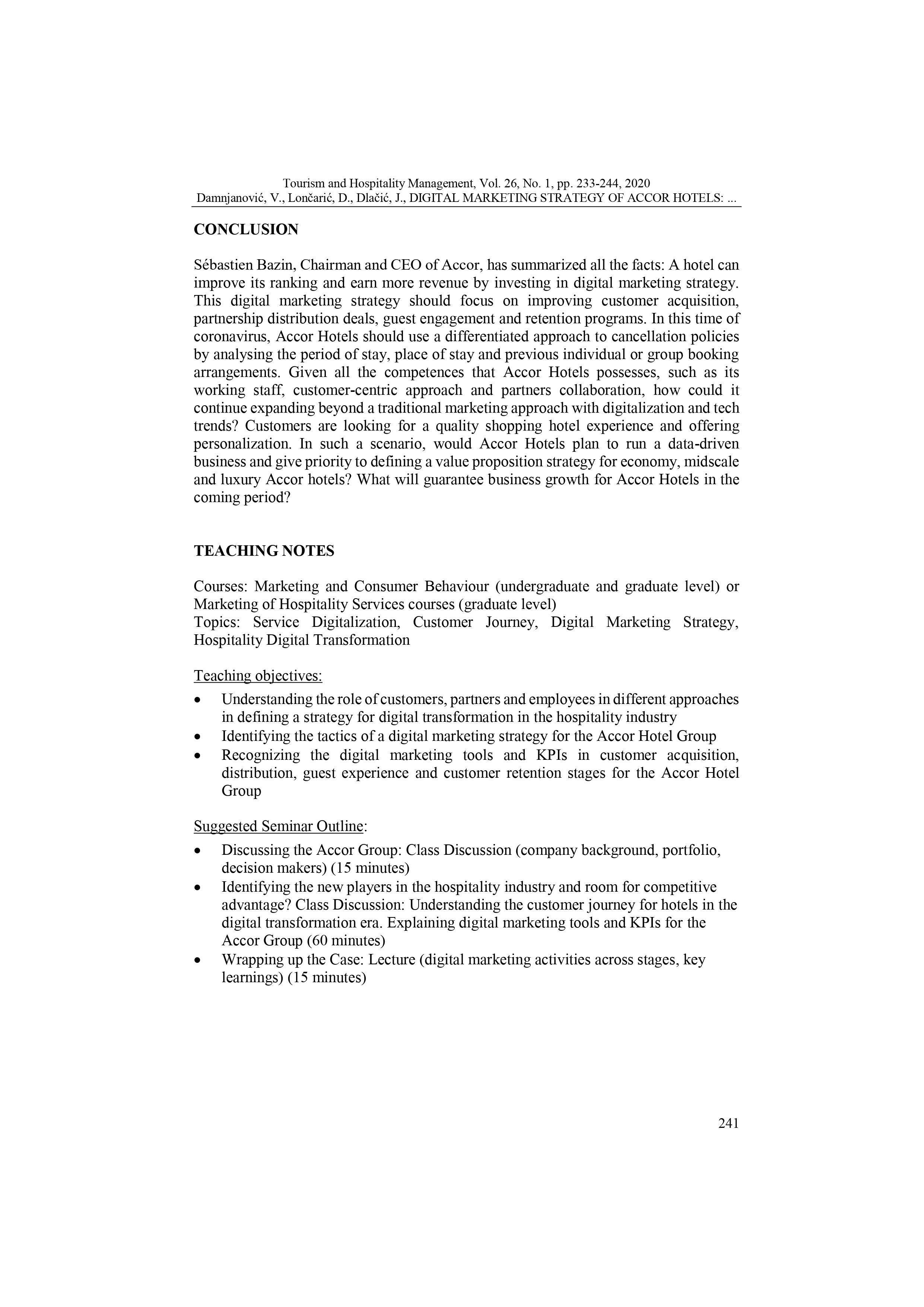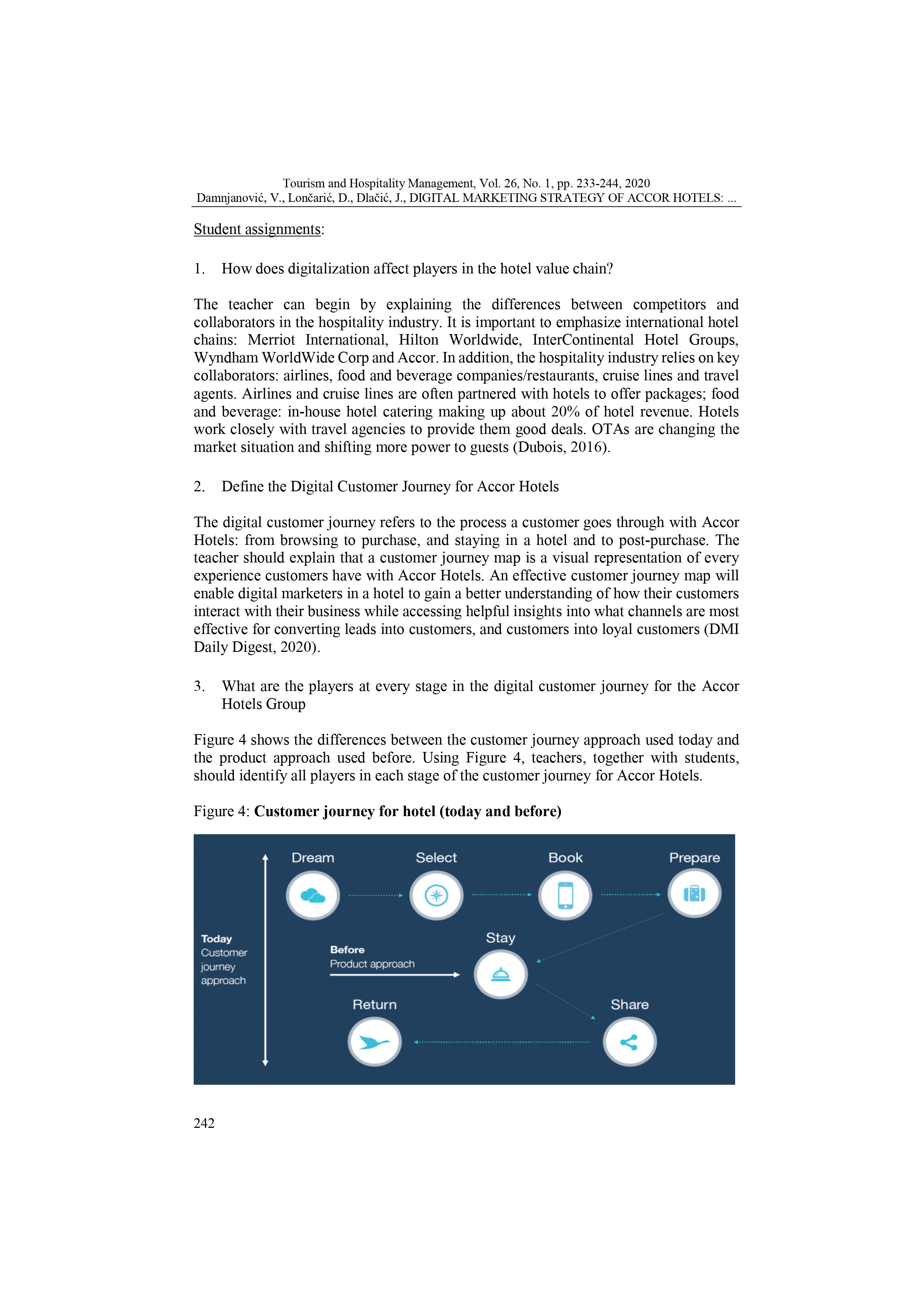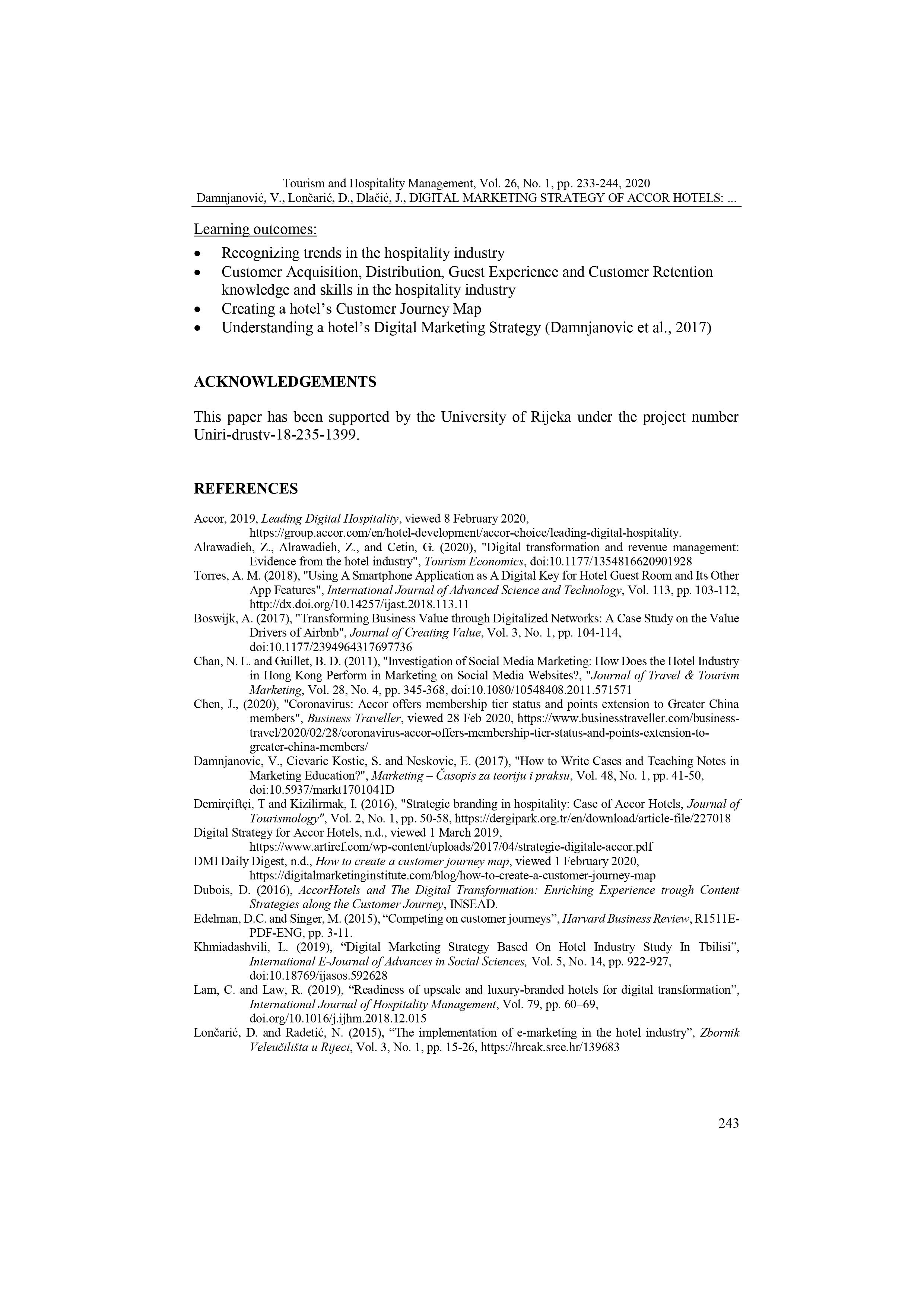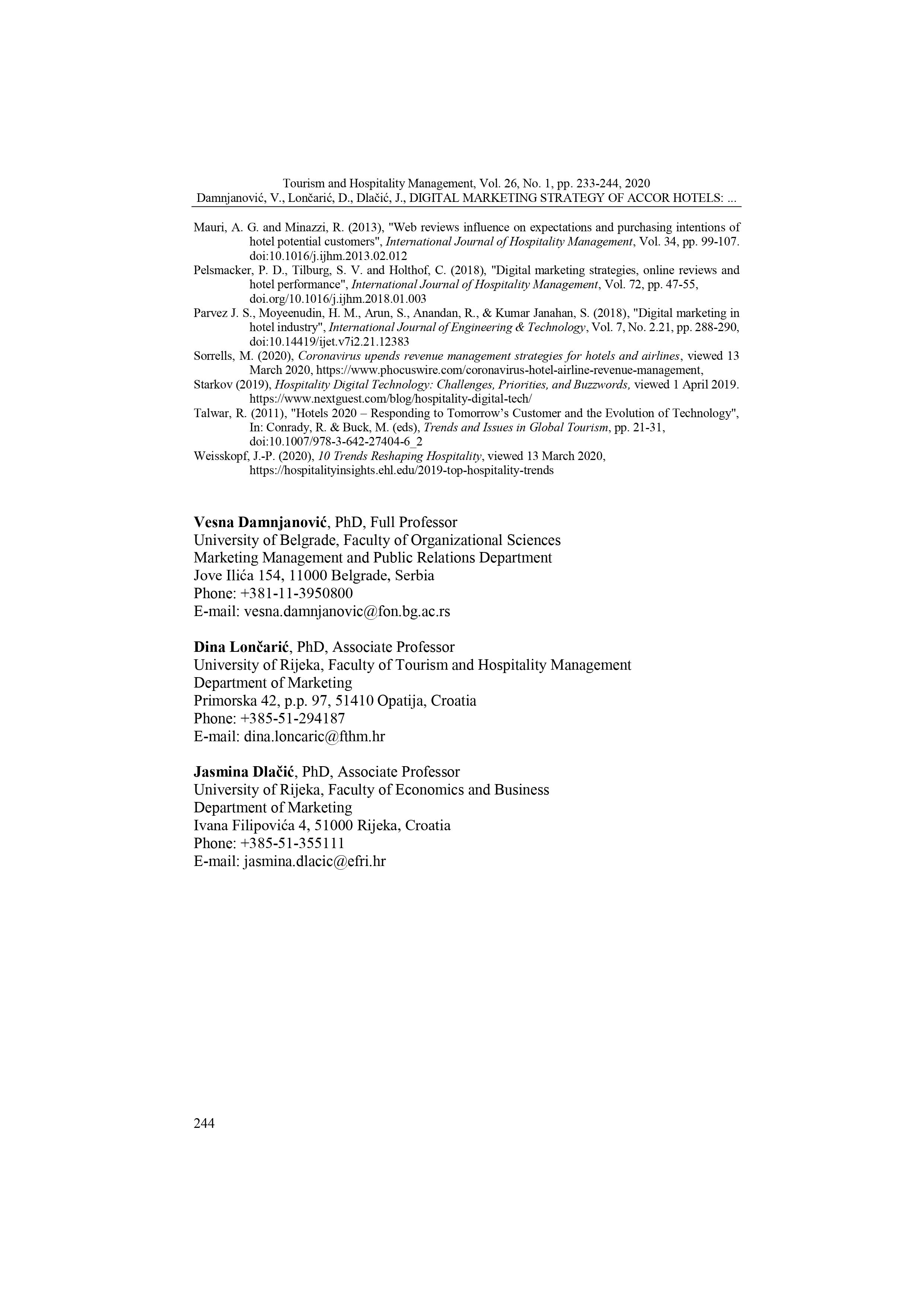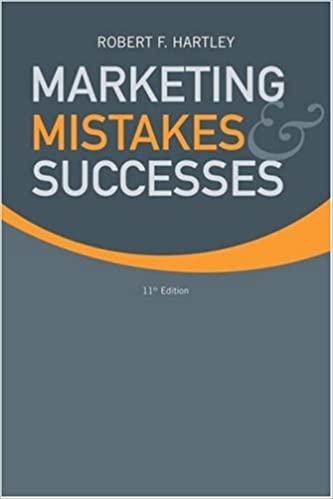In the discussion forums for the week we are going to investigate customer journey in two of Accor's segments: The Budget conscious traveler (IBIS brand) and the Resorts. Using the case, your experiences and research envision/visualize the customer journey from the initial search for hospitality services, interacting with Accor services to finally completing their stay at an Accor operated facility or franchise.
- Lay out the distinct steps in the customer journey. For each step
- What is the customer doing at each stage and how are they performing their actions?
- Examine the digital marketing technologies that customer use at each stage of their journey
- Why is the customer motivated to keep going to the next stage? What emotions are they feeling? Why do they care?
- What are the uncertainties, jargon, or other issues preventing the customer from moving to the next stage?
Tourism and Hospitality Management, Vol. 26, No. 1, pp. 233-244, 2020 Damnjanovi, V., Lonari, D., Dlaie', 1., DIGITAL MARKETING STRATEGY OF ACCOR HOTELS: TEACHING CASE STUDY DIGITAL MARKETING STRATEGY OF ACCOR HOTELS: SHAPING THE FUTURE OF HOSPITALITY tD Vesna Damnjanovic' t9 Dina Lonaric' ya; '3 J asmina Dlac1c Abstract Purpose The main aim of this case study is to explain the digital marketing strategy for different target segments of Accor Hotels, the most diversied hotel player. Design We present a business case study about Accor Hotels, together with teaching notes that teachers will be able to use in the classroom. Methodology The business case study methodological approach, using secondary data from a variety of valuable sources, was applied to present the success story of the digital marketing strategy of Accor Hotels. The case study consists of the Opening paragraph, Introduction, Hospitality industry players, About Accor Hotels, Customer journey in the hospitality industry, Digital marketing strategy for Accor Hotels, Conclusion and Teaching notes. Approach 7 Authors are focusing on a case study example to present best practices from the hospitality indstry in the era of digitalization. Findings 7 The major input for developing the right digital marketing strategy is understanding the stages of the digital customer journey. The case study present the hotels' current (loyal) and potential clients as well as hotel marketing strategies. Marketing strategies include changes in the hotel portfolio offering, different pricing levels, communication and content marketing strategy, and partnership deals with all players in the hospitality industw. This case study is interesting for both the academia and industry experts. Originality of the research We explain how hotel managers dene client value proposition for Accor Hotels, with a better understanding of modern trends in the hospitality industry: di gitali7ati on, personali7ation, innovative business models and faster response to client needs. This case study is intended for teaching in Digital Marketing or Hospitality Management courses for masters or undergraduate students. Keywords Digital Marketing, Accor Hotels, Strategy, Digitalization, Customer journey OPENING PARAGRAPH Sbastien Bazin, Chairman and CEO of Accor, preparing for Investor Day: Digital Transformation Strategy for Accor Hotels and thinking about the Accor Hotels' Vision said, \"We create new opportunities to maximize the business of hospitality by combining our brands with our real-world solutions, seamless global networks, and specialist expertise. Accor Group is built upon four brand pillars: maximize performance, empowered talent, open innovation and acting for a meaningful hospitality, that embrace the future while continuing to put people 7 guests, customers and talents i at the heart of everything we do\". Accor is shaping the future of hospitality by digitalizing the customer experience and providing value propositions for all partners in the hospitality value chain. 233 Tourism and Hospitality Management, Vol. 26, No. 1, pp. 233-244, 2020 Damnjanovi, V., Lonari, D., Dlaic', 1., DIGITAL MARKETING STRATEGY OF ACCOR HOTELS: 1. INTRODUCTION Today's hospitality industry is being transformed into an integral digital technology- enablcd provider powered by different tech tools and applications: mobile, cloud, online travel agency (OTA), AI (chatbot, dynamic pricing, database management), blockchain, IoT, AR and VR. Thus, hotels have the potential to engage with guests at every possible touchpoint of the customer journey and provide them with opportunities to create personalized experiences throughout their lifetimes. Many recent studies emphasize, however, that hotels need to go through a digital transformation to meet the changing demands of customer experience and should focus on a customercentric approach to stay ahead of both traditional competitors and industry disruptors (sharing digital platform) in a competitive tourist environment (Lam and Law, 2019; Zach et al., 2020; Torres, 2018). Furthermore, the impact of the coronavirus (COVlD-l9) is shifting daily; it is impacting travel brands across every sector, from hospitality to air transport to cruises to tour operators (Sorrells, 2020). Referring to recent news 'om Business Traveller, Chen (2020) explains that Accor has joined a growing list of hotel groups that are offering membership tier status and points extensions to members of their loyalty programs Accor Live Limitless (40 million members) for one year more in the Greater China region. Accor Hotels has also extended the booking change and cancellation fee waiver for guests travelling to or from mainland China, Hong Kong Macau and Taiwan until March 31, 2020. In the hospitality industry, being customer centric is not enough. It is also crucial to create partnership deals in order to stay competitive and reach revenue slreams from collaborators: airlines, food and beverage companies/ restaurants, cruise lines and travel agents. Accor Hotels is building digital capabilities, leveraging the partnership with digital providers in the tourism industry: online travel agency and metasearch sites. Revenues of OTAs and alternative lodging platforms such as Airbnb have been rising rapidly. Another challenge is to secure the internal digital competence of people to manage the digital marketing strategy for hotels. Accor is connecting employees for a connected customer experience by educating them with strong global and national sales teams: 700 sales representatives in 45 sales ofces and an ecommeree team of 250 experts worldwide. Hotel companies should understand how to choose and apply digital tech solutions in their everyday environment to improve guest satisfaction, partner collaboration and employee know-how (Starkov, 2019). Another important competence is to be ready to respond quickly to the coronavirus (COVlD-l9) and provide crisis management plans for surviving the global pandemic. The three targets of the new digital Accor experience are customers (seamless journey), partners (transparent relationship) and employees (digital empowerment). Accor boasts an ambitious digital strategy based on a 225 million 5-year plan to enhance the digital experience of their customers, partners and employees (Accor, 2019). 234 Tourism and Hospitality Management, Vol. 26, No. 1, pp. 233-244, 2020 Damnjanovi, V., Lonari, D., Dlaic', 1., DIGITAL MARKETING STRATEGY OF ACCOR HOTELS: 2. HOSPITALITY INDUSTRY PLAYERS The hospitality industry has been undergoing tremendous changes and disruptions over the last two decades. What key trends have been steadily reshaping the hospitality industry? Customers request extreme personalization, unique travelling experiences. This could very well lead to the death of the travel agent and the rise of the independent traveller. New generations such as Gen Z and Gen Y have different requirements and needs compared to older generations (Toress, 2018). \"Older generations think about hotels and car rentals. Younger generations think about Airbe and Uber.\" (Weisskopf, 2020) Hotel customers are now more knowledgeable and empowered to tell more, complain more and expect more. Digital transformation and new digital attackers are changing the rules and disrupting the traditional value chain in the tourism industry. There are three groups of digital attackers (see Figure l comparing level of change and share of value chain): - Disruptors (Airbnb, HomeAway) with a high level of change and a high level of share in the value chain. Airbnb as the market leader in P2P (peer-to-peer) accommodation. According to a study (Boswijk, 2017), Airbnb's initial value proposition combined experience and economic benets for travellers and for residents in tourist areas. 0 Innovators (Bookingcom, Expedia), online travel agents with a medium level of change and a medium share in the value chain. They develop their private rental offer. Expedia provides the tools to manage the guest in stay. The brands owned by Booking Holdings and Expedia are such that these companies have almost replaced hotel brands. o Aggregators metasearch sites (TripAdvisor, SkyScarmer, Kayak) with a low level of change and a low share in value chain. A travel aggregator is a website that finds availabilities and prices of travel offerings across many sources and aggregates them all in one place. This helps users nd the best prices out of all the results the aggre gator has found. That makes it easy for consumers to know that they are booking at the lowest price and it has also led to improvements in the quality of the services provided by hospitality companies that could not easily differentiate on the market based on pricing. 235 Tourism and Hospitality Management, Vol. 26, No. 1, pp. 233-244, 2020 Damnjanovic, V., Loncaric, D., Dlacic, J., DIGITAL MARKETING STRATEGY OF ACCOR HOTELS: ... Figure 1: New digital attackers in the tourism industry NEW DIGITAL ATTACKERS Production/ Product Mot./ CAM/ Sales Level of change airbnb HomeAway Disruptore Booking.com Medium Innovators Expedia Agregators skyscanner Medium KAYAK Share of value chain Source: Digital Strategy for Accor Hotels While new attackers are focusing on experience and restaurant booking, hotels (Marriot, Hilton, Hyatt and Accor Group) are focusing on the customer experience, customer lifetime value and customer loyalty. 3. ABOUT ACCOR HOTELS Accor, a global leader in augmented hospitality, offers unique experiences in close to 4,800 hotels, resorts and residences in 100 countries. Accor is present across all continents. It accounts for 47% of all rooms offered in the hotel industry in Europe, 30% in ASPAC, 9% in MEA, 8% in South America and 5% in NCAC. For more than 50 years, Accor has combined the full breadth of its hotel know-how and diversified portfolio from Sofitel hotel: luxury&upscale (26%), Novotel and Mercur hotels: midscale (34%) to Ibis hotel: economy brands (40%). (Accor's Integrated Report, 2018.) Accor has adopted an asset-light business model that brings together value-creation mechanisms and the hotels operating under its brands (Demirciftci and Kizilirmak, 2016). Accor works with hotels it does not own, maximizing their revenue through the brands and services (marketing, loyalty programs, distribution systems, etc.) it develops for them. 236Tourism and Hospitality Management, Vol. 26, No. 1, pp. 233-244, 2020 Damnjanovic, V., Loncaric, D., Dlacic, J., DIGITAL MARKETING STRATEGY OF ACCOR HOTELS: ... Figure 2: The Accor business model -635bn 839% of which made locally" Guests 6149m direct and indirect jobs 0% of which created locally 12 Hotel business volume $3.6bn -620bn 17,000 270,000 EL.Sun Accor hotel -50% employees Environment employees of expenses O 60.8hmm Accor and m ACCOR suppliers communities suppliers 65bn in purchases EBITDA 50.7bn 100+ countries 55,000+ suppliers Hotel EBIT Adjusted 9 Minority -0.5mt of food" EBITDA holdings 45cu.m of water" Elbn 5.3 teq CO* Public authorities Shareholders 60.1bn 60.3bn Source: Accor's Integrated Report, 2018 Accor derives its "hotel" revenue from three types of fees and services (see Figure 2): The first revenue stream: a trademark fee (flow 4), based on a percentage of the hotel's revenue (franchise and management contracts); The second revenue stream: mandatory and additional service fees (flow 5). Mandatory fees include marketing and sales fees, distribution and loyalty fees and IT fees (franchise and management contracts); The third revenue stream: for managed hotels only, there is an incentive bonus (flow ) based on the EBITDAR (Earnings before interest, taxes, depreciation, amortization, and restructuring or rent costs) generated by the hote the hotel. This rewards Accor's sound management of the hotel on behalf of the owner (Accor's Integrated Report, 2018). Increasing revenue streams for Accor Hotels requires different strategic marketing approaches to new and current guests (Alrawadich et al., 2020). Loyal guests should come more frequently and spend more money, while new guests should experience one of the hotels in the diversified offering of Accor Hotels. 4. CUSTOMER JOURNEY IN THE HOSPITALITY INDUSTRY Digital tools provide new power for shoppers to more easily compare a hotel's offering and price and place an order. Sometimes, interaction between hotels and customers is limited because the content present in the digital marketing strategy is not engaging enough to make the customers start or participate in a discussion (Chen, 2011). The benefits of digital marketing are in low costs and in the ability to personalize promotional material. A study (Parvez et al., 2018) has shown that optimizing a hotel's website can frequently lead to better hotel performance. 237Tourism and Hospitality Management, Vol. 26, No. 1, pp. 233-244, 2020 Damnjanovic, V., Loncaric, D., Dlacic, J., DIGITAL MARKETING STRATEGY OF ACCOR HOTELS: ... Accor Hotels use new technology, processes and organizational structures to proactively lead the customer digital journey. According to Edelman and Singer (2015), journey managers must be able to answer financial questions such as " What new revenue streams do we need to generate?" and "What is the variable cost per customer or action that we can afford for each journey?". They also need to assess customer satisfaction with the entire journey and with interactions at specific touchpoints. Accor creates its customer journey approach in three stages: the pre-travel stage, stay stage and post-travel stage. The pre-travel stage consists of four steps: dream, select, book and prepare. In the post- travel stage, customers share their satisfaction or dissatisfaction, and based on positive or negative customer experience they will recommend and return to Accor Hotels or switch to another brand. Players at every stage for Accor Hotels are (see Figure 3): Pinterest, https://www.pinterest.com/ Photos platform (Dream stage) Trivago, trivago.com - Compare hotel prices worldwide (Select stage) . . Booking.com, travel metasearch engine for lodging reservations (Book stage) Wipolo, https://www.wipolo.com/, is a mobile app that centralizes all your travels Prepare stage) Ibis, Novotel. Economy and middle scale Accor hotels (Stay stage) . Trip Advisor, https://www.tripadvisor.com/ perfect travel planner (Share stage) Starwood's Preferred Guest (SPG) loyalty program (Return stage) Figure 3: Steps and players at every stage of the customer journey approach for Accor Hotels Dream Select Book Prepare Pinterest trivago Booking.com wipolo Stay OVOTEL ibis Return Share tripadvisor Source: Digital Strategy for Accor Hotels Technology has been steadily improving customer experiences, across a breadth of industries, with hospitality being among them. If customer journeys are relatively complex and most visitors are not converting on the first visit, a different approach to customers is necessary. The Accor Group has pushed its hotels to improve their customer and partner management and to enhance their digital capabilities by employing staff experienced in digital media and technologies. They also want to leverage data analytics and re-map digital customer journeys to differentiate themselves through offer innovations to loyal and new customers to achieve customer personalization. 238Tourism and Hospitality Management, Vol. 26, No. 1, pp. 233-244, 2020 Damnjanovi, V., Lonari, D., Dlaic', 1., DIGITAL MARKETING STRATEGY OF ACCOR HOTELS: 5. DIGITAL MARKETING STRATEGY FOR ACCOR HOTELS According to Lonarie and Radetic' (2015), companies that have a higher level of digital marketing practice are able to achieve better business performance. Digital marketing and sales strategies are becoming increasingly important in hotels. Hotels are implementing diverse marketing strategies and developing a wide range of digital marketing tactics. Usually hotels use paid digital tools: Social Media Marketing (SMM): Facebook, Instagram, Snapchat, Twitter, LinkedIn, Email Marketing (own and thirdparty databases), Search Engine Marketing (Google AdWords or Display networks), Publisher Networks (Direct advertising campaigns on specic websites), Programmatic Networks (Using user-intent and contextual marketing targeting travellers) and Review websites (Sponsored content and advertising banners on platforms such as TripAdvisor) (Parvez et al., 2018; Khmiadashvili, 2019; Pelsmacker et al., 2018). Hotels also use their own mobile applications, web strategies and big data marketing as media to improve customer experiences. Traditional marketing tools (TV, radio, web, print, etc.) are also important in the customer acquisition stage and it is necessary to connect with the digital marketing strategy to support an omniehannel strategy. Accor Hotels spends a 100 million budget each year on its traditional marketing strategy. It is important to draw up a digital marketing strategy for each stage of the customer joumey for hotels. Accor Hotels has developed a digital marketing strategy covering all stages: customer acquisition, distribution, guest experience and customer retention (see Table 1). The customer acquisition stage is divided into two parts: a pull strategy for driving demand and a push strategy to convert demand. In pull strategy hotels, Accor Hotels uses traditional marketing channels, combined with digital social media marketing, brand sponsorship search engine marketing and partnership with metaseareh engines. Big data analytics tools and e-mail personalized campaigns are popular in a push strategy when hotel companies have already collected the customer data. The distribution stage for Accor Hotels is the most important channel with a 66% global average contribution rate to hotel revenue (Central Reservation System). This stage includes web partnership strategy, global distribution system partnership, mobile marketing and customer care tools. The guest experience is supported by mobile apps in Accor Hotels, Online check-in & fast cheek-out digital platforms, digital in-app hotel services (room service, restaurant menu, taxi) and one-click payment: personal Ewallet. It is important to emphasize that Accor Hotels integrates city guides online, has partnerships with 500 restaurants bookable online and provides 6,000 free magazines and newspapers via the Accor application. 239 Tourism and Hospitality Management, Vol. 26, No. 1, pp. 233-244, 2020 Damnjanovic, V., Loncaric, D., Dlacic, J., DIGITAL MARKETING STRATEGY OF ACCOR HOTELS: ... Table 1: Digital Marketing Strategy for Accor Hotels Stages in customer Digital Marketing strategy journey Customer Pull strategy for driving demand Acquisition Traditional marketing channels Social Media Marketing strategy: presence on Facebook, Twitter, YouTube, Pinterest & LinkedIn. KPIs: 100 country digital campaigns each year >25 million fans Strong Accor & brand sponsorships: AccorHotels Arena, Roland Garros, Australia Open, 2024 Paris Olympic city, etc. Search Engine Marketing strategy: High-impact Paid Search Advertising: KPI: Budget > E45 million invested each year Partnership Strategy: Booming metasearch engines: >20 global partnerships (Trip Advisor, Kayak, Trivago, etc.) Push & Convert Demand Big Data Analytics Strategy: Great guest knowledge & big database: KPI: >60 million individual customers Smart and predictive email marketing campaigns KPI: >1 billion personalized emails sent each year Distribution Web strategy: KPIs: >40% of revenue generated. Accor websites: all.accor.com + brand.com = >330 million yearly visits. Web partners strategy: KPI: 2110 online travel agencies (OTAs) Global Distribution System: Amadeus IT Group, Sabre, traditional travel agencies TAGS: group booking solutions (100% focused on delivering outstanding corporate travel management services and support) Mobile Marketing Strategy: all.accor.com single app: >50% of web visits come from mobile devices Customer care: call centre: 900 sales agents operating in 10 call centres in 18 languages Guest Digital Services for Accor Guest: 70 city guides: available on all.accor.com experience app, Online check-in & fast check-out: personalized (KPI: 5 million transactions) One-click payment: personal E-wallet for 250,000 guests Digital in-app hotel services (room service, restaurant menu, taxi...) KPI: 2,600 hotels equipped Partnership: 500 Restaurants by Accor bookable online Accor press: 6,000 free magazines available via Accor All App Customer Customer Feedback Online Strategy: 100% of hotels equipped to manage Retention guest feedback online (Mauri and Minazzi, 2013) Bring-guests-back strategy: ALL - Accor Live Limitless loyalty program advantage KPIs: 40 million members Source: Accor, 2019 The customer retention strategy of Accor Hotels is about the guest loyalty programme, which accounts for 30.6% of the global average contribution to hotel revenue. The digital marketing strategy is based on knowing customer feedback online in order to improve the customer experience. 240Tourism and Hospitality Management, Vol. 26, No. 1, pp. 233-244, 2020 Damnjanovi, V., Lonari, D., Dlaie', 1., DIGITAL MARKETING STRATEGY OF ACCOR HOTELS: CONCLUSION Sbastien Bazin, Chairman and CEO of Accor, has summarized all the facts: A hotel can improve its ranking and earn more revenue by investing in digital marketing strategy. This digital marketing strategy should focus on improving customer acquisition, partnership distribution deals, guest engagement and retention programs. In this time of coronavirus, Accor Hotels should use a differentiated approach to cancellation policies by analysing the period of stay, place of stay and previous individual or group booking arrangements. Given all the competences that Accor Hotels possesses, such as its working staff, customer-centric approach and partners collaboration, how could it continue expanding beyond a traditional marketing approach with digitalization and tech trends? Customers are looking for a quality shopping hotel experience and offering personalization. In such a scenario, would Accor Hotels plan to run a data-driven business and give priority to dening a value proposition strategy for economy, midscale and luxury Accor hotels? What will guarantee business growth for Accor Hotels in the coming period? TEACHING NOTES Courses: Marketing and Consumer Behaviour (undergraduate and graduate level) or Marketing of Hospitality Services courses (graduate level) Topics: Service Digitalization, Customer Joumey, Digital Marketing Strategy, Hospitality Digital Transformation Teaching objectives: 0 Understanding the role of customers, partners and employees in different approaches in dening a strategy for digital transformation in the hospitality industry 0 Identifying the tactics of a digital marketing strategy for the Accor Hotel Group - Recognizing the digital marketing tools and KPls in customer acquisition, distribution, guest experience and customer retention stages for the Accor Hotel Group Suggested Seminar Outline: - Discussing the Accor Group: Class Discussion (company background, portfolio, decision makers) (15 minutes) 0 Identifying the new players in the hospitality industry and room for competitive advantage? Class Discussion: Understanding the customer journey for hotels in the digital transformation era. Explaining digital marketing tools and KPls for the Accor Group (60 minutes) a Wrapping up the Case: Lecture (digital marketing activities across stages, key learnings) (15 minutes) 241 Tourism and Hospitality Management, Vol. 26, No. 1, pp. 233-244, 2020 Damnjanovi, V., Lonari, D., Dlaic', 1., DIGITAL MARKETING STRATEGY OF ACCOR HOTELS: Student assignments: 1. How does digitalization affect players in the hotel value chain? The teacher can begin by explaining the differences between competitors and collaborators in the hospitality industry. It is important to emphasize international hotel chains: Merriot International, Hilton Worldwide, InterContinental Hotel Groups, Wyndham WorldWide Corp and Accor. In addition, the hospitality industry relies on key collaborators: airlines, food and beverage companies/restaurants, cruise lines and travel agents. Airlines and cruise lines are otten partnered with hotels to offer packages; food and beverage: in-house hotel catering making up about 20% of hotel revenue. Hotels work closely with travel agencies to provide them good deals. OTAs are changing the market situation and shifting more power to guests (Dubois, 2016). 2. Dene the Digital Customer Journey for Accor Hotels The digital customer journey refers to the process a customer goes through with Accor Hotels: from browsing to purchase, and staying in a hotel and to post-purchase. The teacher should explain that a customer journey map is a visual representation of every experience customers have with Accor Hotels. An effective customer journey map will enable digital marketers in a hotel to gain a better understanding of how their customers interact with their business while accessing helpful insights into what channels are most effective for converting leads into customers, and customers into loyal customers (DMI Daily Digest, 2020). 3. What are the players at every stage in the digital customer journey for the Accor Hotels Group Figure 4 shows the differences between the customer journey approach used today and the product approach used before. Using Figure 4, teachers, together with students, should identify all players in each stage of the customer journey for Accor Hotels. Figure 4: Customer journey for hotel (today and before) Dream Select Book Prepare 6...!) Stay Return Share 242 Tourism and Hospitality Management, Vol. 26, No. 1, pp. 233-244, 2020 Damnjanovic, V., Loncaric, D., Dlacic, J., DIGITAL MARKETING STRATEGY OF ACCOR HOTELS: ... Learning outcomes: Recognizing trends in the hospitality industry . Customer Acquisition, Distribution, Guest Experience and Customer Retention knowledge and skills in the hospitality industry Creating a hotel's Customer Journey Map Understanding a hotel's Digital Marketing Strategy (Damnjanovic et al., 2017) ACKNOWLEDGEMENTS This paper has been supported by the University of Rijeka under the project number Uniri-drustv-18-235-1399. REFERENCES Accor, 2019, Leading Digital Hospitality, viewed 8 February 2020, https://group.accor.com/en/hotel-development/accor-choice/leading-digital-hospitality. Alrawadieh, Z., Alrawadieh, Z., and Cetin, G. (2020), "Digital transformation and revenue management: Evidence from the hotel industry", Tourism Economics, doi:10.1177/1354816620901928 Torres, A. M. (2018), "Using A Smartphone Application as A Digital Key for Hotel Guest Room and Its Other App Features", International Journal of Advanced Science and Technology, Vol. 113, pp. 103-112, http://dx.doi.org/10.14257/ijast.2018.113.11 Boswijk, A. (2017), "Transforming Business Value through Digitalized Networks: A Case Study on the Value Drivers of Airbnb", Journal of Creating Value, Vol. 3, No. 1, pp. 104-114, doi:10.1177/2394964317697736 Chan, N. L. and Guillet, B. D. (2011), "Investigation of Social Media Marketing: How Does the Hotel Industry in Hong Kong Perform in Marketing on Social Media Websites?, "Journal of Travel & Tourism Marketing, Vol. 28, No. 4, pp. 345-368, doi: 10.1080/10548408.2011.571571 Chen, J., (2020), "Coronavirus: Accor offers membership tier status and points extension to Greater China members", Business Traveller, viewed 28 Feb 2020, https://www.businesstraveller.com/business- travel/2020/02/28/coronavirus-accor-offers-membership-tier-status-and-points-extension-to- greater-china-members/ Damnjanovic, V., Cicvaric Kostic, S. and Neskovic, E. (2017), "How to Write Cases and Teaching Notes in Marketing Education?", Marketing - Casopis za teoriju i praksu, Vol. 48, No. 1, pp. 41-50, doi: 10.5937/markt1701041D Demirciftci, T and Kizilirmak, I. (2016), "Strategic branding in hospitality: Case of Accor Hotels, Journal of Tourismology", Vol. 2, No. 1, pp. 50-58, https://dergipark.org.tr/en/download/article-file/227018 Digital Strategy for Accor Hotels, n.d., viewed 1 March 2019, https://www.artiref.com/wp-content/uploads/2017/04/strategie-digitale-accor.pdf DMI Daily Digest, n.d., How to create a customer journey map, viewed 1 February 2020, https://digitalmarketinginstitute.com/blog/how-to-create-a-customer-journey-map Dubois, D. (2016), AccorHotels and The Digital Transformation: Enriching Experience trough Content Strategies along the Customer Journey, INSEAD. Edelman, D.C. and Singer, M. (2015), "Competing on customer journeys", Harvard Business Review, R1511E- PDF-ENG, pp. 3-11. Khmiadashvili, L. (2019), "Digital Marketing Strategy Based On Hotel Industry Study In Tbilisi" International E-Journal of Advances in Social Sciences, Vol. 5, No. 14, pp. 922-927, doi:10.18769/ijasos.592628 Lam, C. and Law, R. (2019), "Readiness of upscale and luxury-branded hotels for digital transformation", International Journal of Hospitality Management, Vol. 79, pp. 60-69 doi.org/10.1016/j.ijhm.2018.12.015 Loncaric, D. and Radetic, N. (2015), "The implementation of e-marketing in the hotel industry", Zbornik Veleucilista u Rijeci, Vol. 3, No. 1, pp. 15-26, https://hrcak.srce.hr/139683 243Tourism and Hospitality Management, Vol. 26, No. 1, pp. 233-244, 2020 Damnjanovic, V., Loncaric, D., Dlacic, J., DIGITAL MARKETING STRATEGY OF ACCOR HOTELS: ... Mauri, A. G. and Minazzi, R. (2013), "Web reviews influence on expectations and purchasing intentions of ntial customers", International Journal of Hospitality Management, Vol. 34, pp. 99-107. doi: 10.1016/j.ijhm.2013.02.012 Pelsmacker, P. D., Tilburg, S. V. and Holthof, C. (2018), "Digital marketing strategies, online reviews and hotel performance", International Journal of Hospitality Management, Vol. 72, pp. 47-55 doi.org/10.1016/j.ijhm.2018.01.003 Parvez J. S., Moyeenudin, H. M., Arun, S., Anandan, R., & Kumar Janahan, S. (2018), "Digital marketing in hotel industry", International Journal of Engineering & Technology, Vol. 7, No. 2.21, pp. 288-290, doi: 10.14419/ijet.v712.21.12383 Sorrells, M. (2020), Coronavirus upends revenue management strategies for hotels and airlines, viewed 13 March 2020, https://www.phocuswire.com/coronavirus-hotel-airline-revenue-management, Starkov (2019), Hospitality Digital Technology: Challenges, Priorities, and Buzzwords, viewed 1 April 2019. https://www.nextguest.com/blog/hospitality-digital-tech/ Talwar, R. (2011), "Hotels 2020 - Responding to Tomorrow's Customer and the Evolution of Technology", In: Conrady, R. & Buck, M. (eds), Trends and Issues in Global Tourism, pp. 21-31, doi: 10.1007/978-3-642-27404-6_2 Weisskopf, J.-P. (2020), 10 Trends Reshaping Hospitality, viewed 13 March 2020, https://hospitalityinsights.ehl.edu/2019-top-hospitality-trends Vesna Damnjanovic, PhD, Full Professor University of Belgrade, Faculty of Organizational Sciences Marketing Management and Public Relations Department Jove Ilica 154, 11000 Belgrade, Serbia Phone: +381-11-3950800 E-mail: vesna.damnjanovic@fon.bg.ac.rs Dina Loncaric, PhD, Associate Professor University of Rijeka, Faculty of Tourism and Hospitality Management Department of Marketing Primorska 42, p.p. 97, 51410 Opatija, Croatia Phone: +385-51-294187 E-mail: dina.loncaric@fthm.hr Jasmina Dlacic, PhD, Associate Professor University of Rijeka, Faculty of Economics and Business Department of Marketing Ivana Filipovica 4, 51000 Rijeka, Croatia Phone: +385-51-355111 E-mail: jasmina. dlacic@efri.hr 244
